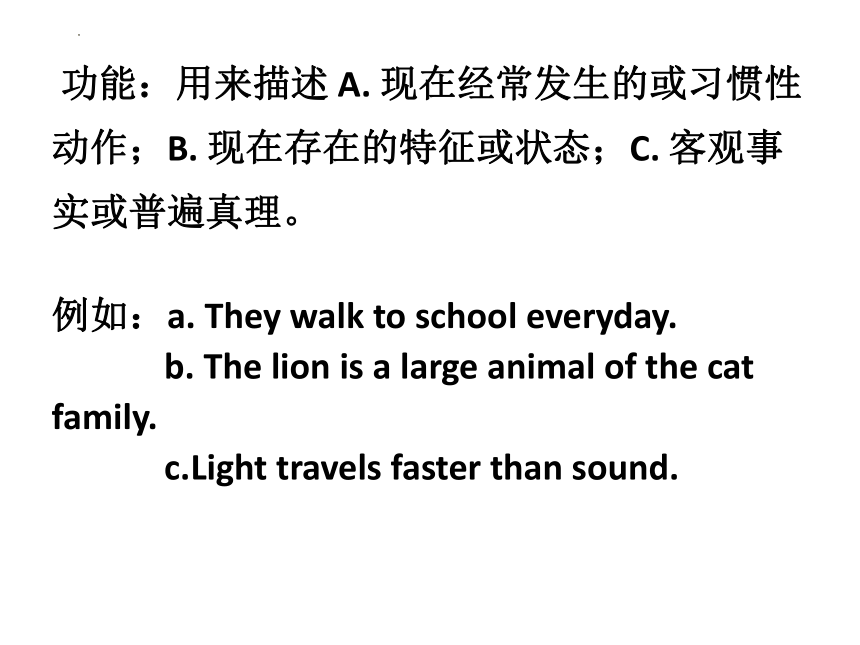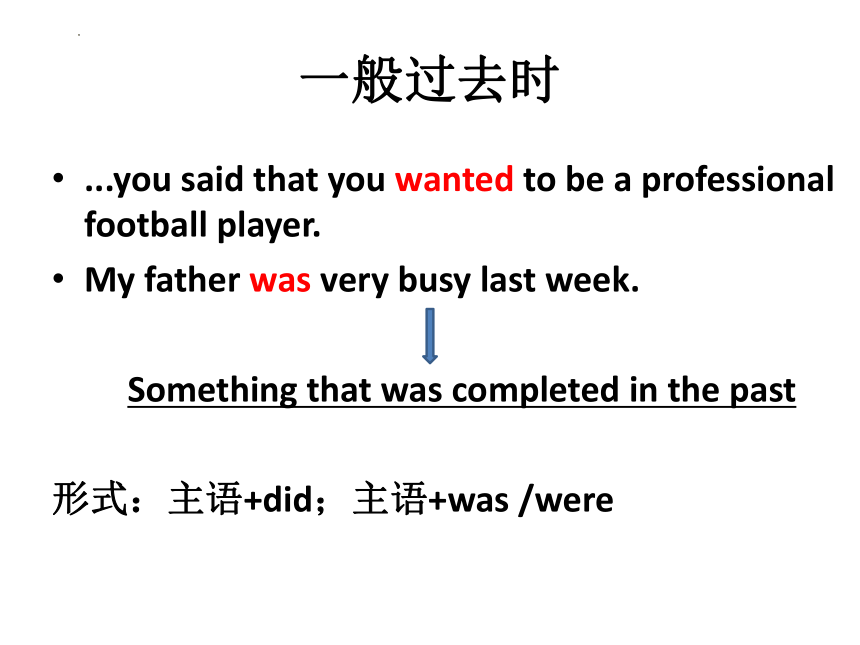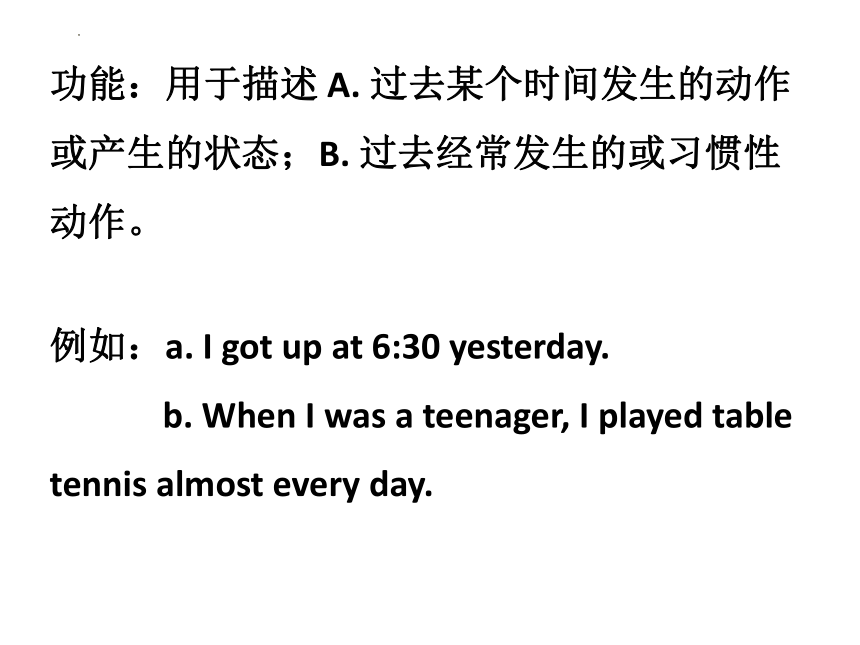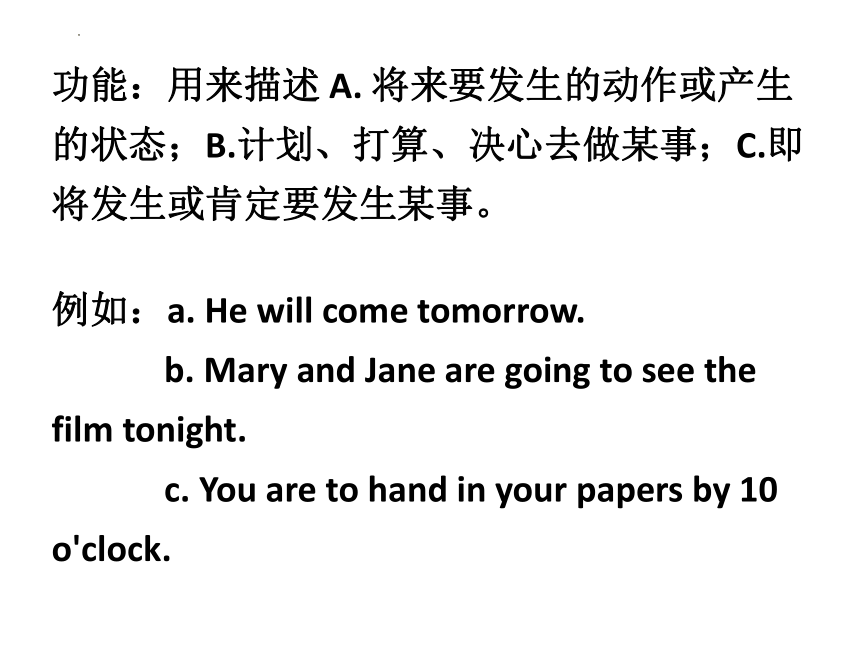外研版(2019) 必修第一册 Unit 2 Exploring English Using language 课件(17张PPT)
文档属性
| 名称 | 外研版(2019) 必修第一册 Unit 2 Exploring English Using language 课件(17张PPT) |  | |
| 格式 | pptx | ||
| 文件大小 | 125.3KB | ||
| 资源类型 | 教案 | ||
| 版本资源 | 外研版(2019) | ||
| 科目 | 英语 | ||
| 更新时间 | 2022-10-24 21:00:11 | ||
图片预览







文档简介
(共17张PPT)
Review: tenses
2020.10.11
一般现在时
Lawyers help people and are respected by others.
Mary is good at music.
Something that happens regularly in the present
形式:主语+do/does;主语+is/am/are
功能:用来描述 A. 现在经常发生的或习惯性动作;B. 现在存在的特征或状态;C. 客观事实或普遍真理。
例如:a. They walk to school everyday.
b. The lion is a large animal of the cat family.
c.Light travels faster than sound.
一般过去时
...you said that you wanted to be a professional football player.
My father was very busy last week.
Something that was completed in the past
形式:主语+did;主语+was /were
功能:用于描述 A. 过去某个时间发生的动作或产生的状态;B. 过去经常发生的或习惯性动作。
例如:a. I got up at 6:30 yesterday.
b. When I was a teenager, I played table tennis almost every day.
一般将来时
...you will have two options for your future.
I shall speak at the meeting tomorrow.
Shall we start to work
What are you going to do next Sunday
Who is to clean the classroom today
I'm leaving for Beijing next month.
Something that is certain to take place in the future.
形式:主语+will/shall;主语+am/is/are+going to do;主语+am/is /are+to do;主语+am /is/are+doing
功能:用来描述 A. 将来要发生的动作或产生的状态;B.计划、打算、决心去做某事;C.即将发生或肯定要发生某事。
例如:a. He will come tomorrow.
b. Mary and Jane are going to see the film tonight.
c. You are to hand in your papers by 10 o'clock.
现在进行时
Grandfather and Father, seated at the table, are playing chess.
Something that is currently taking place.
形式:主语+am/is/are+doing
功能:用来描述 A.此时此刻正在进行的动作;B.当前一段时间正在进行的动作。
例如:a. We are waiting for you now.
b. We are making model planes these days.
现在完成时
... you have found the career that suits your talents.
形式:主语+have/has+done
Something that starts in the past and is affecting the present.
功能:用来描述 A.过去发生的动作对现在产生的结果、影响;B.过去的动作或状态持续到现在。
例如:a. He has lost his wallet.
b. She has been busy with her work since last week.
过去将来时
He said he would come back the next day.
He was going to play tennis that afternoon.
As I was to leave next day, I went to bed early on Tuesday evening.
功能:通常指按过去的计划、安排即将在某一过去时间发生的事态。
形式:主语+would+do;主语+was/were going to +do;主语+was/were to+ do
过去进行时
When I went downstairs, they were eating breakfast.
形式:主语+was/were+doing
a. 表示过去某一时刻正在进行的动作
What were you doing yesterday at seven p.m.
b. 表示过去某一阶段一直进行的动作
From 1983 to 1988, he was teaching at Yale.
c. 指过去某一阶段暂时性的习惯
George was getting up at five every day that week.
d. 表示按照计划安排即将发生的过去将来事态。
They were leaving a few days later.
The summer vacation was drawing near, but nobody knew where they were going for the holiday.
过去完成时
I had written the article when they came.
形式:主语+ had+ done
a.表示一个动作或状态在过去某时之前已经完成或结束
He knew he had met her before.
Tom flew home, but his father had already died.
b.在过去某时之前已经开始,一直延续到这一过去时间,而且到那时还未结束,仍有继续下去的可能
By six o'clock they had worked twelve hours.
She said that she had made much progress since she came here.
In 1960, I'd known him for ten years; I met him for the first time in 1950.
现在完成进行时vs过去完成进行时
现在完成进行时:主语+have been+doing
I've been writing letters for an hour (and I've still got some more to do).
I've been sitting in the garden (and have just come indoors).
过去完成进行时:主语+had been+doing
I'd been working for some time when he called.
How long had it been raining before you shut the window
Review: tenses
2020.10.11
一般现在时
Lawyers help people and are respected by others.
Mary is good at music.
Something that happens regularly in the present
形式:主语+do/does;主语+is/am/are
功能:用来描述 A. 现在经常发生的或习惯性动作;B. 现在存在的特征或状态;C. 客观事实或普遍真理。
例如:a. They walk to school everyday.
b. The lion is a large animal of the cat family.
c.Light travels faster than sound.
一般过去时
...you said that you wanted to be a professional football player.
My father was very busy last week.
Something that was completed in the past
形式:主语+did;主语+was /were
功能:用于描述 A. 过去某个时间发生的动作或产生的状态;B. 过去经常发生的或习惯性动作。
例如:a. I got up at 6:30 yesterday.
b. When I was a teenager, I played table tennis almost every day.
一般将来时
...you will have two options for your future.
I shall speak at the meeting tomorrow.
Shall we start to work
What are you going to do next Sunday
Who is to clean the classroom today
I'm leaving for Beijing next month.
Something that is certain to take place in the future.
形式:主语+will/shall;主语+am/is/are+going to do;主语+am/is /are+to do;主语+am /is/are+doing
功能:用来描述 A. 将来要发生的动作或产生的状态;B.计划、打算、决心去做某事;C.即将发生或肯定要发生某事。
例如:a. He will come tomorrow.
b. Mary and Jane are going to see the film tonight.
c. You are to hand in your papers by 10 o'clock.
现在进行时
Grandfather and Father, seated at the table, are playing chess.
Something that is currently taking place.
形式:主语+am/is/are+doing
功能:用来描述 A.此时此刻正在进行的动作;B.当前一段时间正在进行的动作。
例如:a. We are waiting for you now.
b. We are making model planes these days.
现在完成时
... you have found the career that suits your talents.
形式:主语+have/has+done
Something that starts in the past and is affecting the present.
功能:用来描述 A.过去发生的动作对现在产生的结果、影响;B.过去的动作或状态持续到现在。
例如:a. He has lost his wallet.
b. She has been busy with her work since last week.
过去将来时
He said he would come back the next day.
He was going to play tennis that afternoon.
As I was to leave next day, I went to bed early on Tuesday evening.
功能:通常指按过去的计划、安排即将在某一过去时间发生的事态。
形式:主语+would+do;主语+was/were going to +do;主语+was/were to+ do
过去进行时
When I went downstairs, they were eating breakfast.
形式:主语+was/were+doing
a. 表示过去某一时刻正在进行的动作
What were you doing yesterday at seven p.m.
b. 表示过去某一阶段一直进行的动作
From 1983 to 1988, he was teaching at Yale.
c. 指过去某一阶段暂时性的习惯
George was getting up at five every day that week.
d. 表示按照计划安排即将发生的过去将来事态。
They were leaving a few days later.
The summer vacation was drawing near, but nobody knew where they were going for the holiday.
过去完成时
I had written the article when they came.
形式:主语+ had+ done
a.表示一个动作或状态在过去某时之前已经完成或结束
He knew he had met her before.
Tom flew home, but his father had already died.
b.在过去某时之前已经开始,一直延续到这一过去时间,而且到那时还未结束,仍有继续下去的可能
By six o'clock they had worked twelve hours.
She said that she had made much progress since she came here.
In 1960, I'd known him for ten years; I met him for the first time in 1950.
现在完成进行时vs过去完成进行时
现在完成进行时:主语+have been+doing
I've been writing letters for an hour (and I've still got some more to do).
I've been sitting in the garden (and have just come indoors).
过去完成进行时:主语+had been+doing
I'd been working for some time when he called.
How long had it been raining before you shut the window
